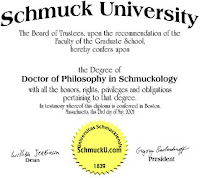 I’m a pro-business kind of guy. I believe in free markets. I celebrate the contribution of entrepreneurs. I believe that capitalism is the greatest wealth-creating system ever created. But I’ve got a big problem — a very big problem — when businesses lobby for tax breaks from government that ordinary citizens could never hope to receive. Here in Virginia, government practitioners appear willing to hand out tax breaks to any special pleader with a story to tell, even as they jack up taxes on everyone else.
I’m a pro-business kind of guy. I believe in free markets. I celebrate the contribution of entrepreneurs. I believe that capitalism is the greatest wealth-creating system ever created. But I’ve got a big problem — a very big problem — when businesses lobby for tax breaks from government that ordinary citizens could never hope to receive. Here in Virginia, government practitioners appear willing to hand out tax breaks to any special pleader with a story to tell, even as they jack up taxes on everyone else.
Two more straws in the wind…
Volkswagen. Over and above the $6 million in subsidies and incentives that the Commonwealth is paying Volkswagen to relocate its US headquarters to Fairfax County (see “Another Data Point on the VW Deal“), it appears that we will be giving VW employees exemptions on car-related taxes as well. Reports Emily Dooley with the Times-Dispatch:
Known around the General Assembly as the “Volkswagen bill,” the legislation exempts employees at automaker headquarters and their families from paying motor vehicle sales and use taxes if they lease a car built by the automobile manufacturer.
Volkswagen Group of America Inc. announced last fall its plans to move 120 employees and its headquarters from Michigan to Fairfax County in April.
A nonemployee pays $750 in taxes when buying a $25,000 Volkswagen. After July 1, a VW headquarters employee would not. Each employee is allowed to lease up to four cars per year for 12 months. Then the cars are sold.
The tax waiver was a benefit in Michigan.
Qimonda. Will Jones with the Times-Dispatch reports today that semiconductor manufacturer Qimonda in eastern Henrico County would get an estimated $1.3 million tax cut this year as part of the county’s proposed budget for fiscal 2008-09. The semiconductor company plans to invest $1.5 billion in the plant over the next several years, and the 27 percent reduction in the machine & tool tax, writes Jones, “would help the memory-chip manufacturer weather a depressed market for its products and make Henrico more attractive for investment by the semiconductor industry.”
Of course, those two tax breaks are chicken feed compared to the ginormous incentives that the City of Fredericksburg is offering to the Kalahari Waterpark to locate an indoor waterpark in the Celebrate Virginia project. (See “Kalahari’s $61 Million Waterpark Subsidy.“) Fredericksburg officials hand out goodies to favored businesses like Halloween candy.
What we’re experiencing in Virginia is the slow-motion transformation of the tax code into a two-tier system: one set of rules for special pleaders who wheedle concessions from lawmakers, and a set of rules of the rest of us schmucks. As the special pleaders whittle away at the tax base, government raise taxes on the schmucks to make up the difference.
State and local officials contend that the tax breaks represent a net gain — without them, VW, Qimonda and Kalahari wouldn’t make the investments, create the jobs and generate the taxes that are projected. What the business-welfare apologists don’t acknowledge is that the schmucks create jobs and pay taxes, too. The difference is, our economic activity is invisible to public policy makers: We don’t hire lobbyists and public relations professionals to make our case. When schmucks pay more in taxes, we have less capital to grow our businesses. Thus, we pay less in taxes in the long run.
Maybe I should just stop complaining about unfair tax treatment and join the crowd. Maybe I can make a case that blogs are a critical component of Virginia’s emerging information economy and that they need to be encouraged and subsidized. Think anyone would buy it?


